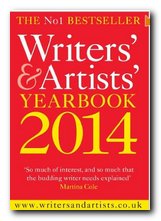a selection of resources reviewed
Writing for newspapers is probably the hardest form of journalism to break into. That’s because newspapers have traditionally been run by ‘closed shop’ unions. They are now also threatened by falling sales as digital publishing grows. But that means they will be forced to rely on freelance writers as they shed staff. These guides will give you invaluable advice on how to deal with editors and newsrooms.
 The Writers’ and Artists’ Year Book
The Writers’ and Artists’ Year Book
It doesn’t matter which branch of journalism, creative writing, or media publishing you wish to pursue, before you have gone very far you will need this book. It’s a compendium of full contact details for agents, agencies, editiorial offices, and publishers in all fields. Book and magazine publishers, newspapers, theatrical agents, picture agencies, and publicists. Plus there are essays written by professional writers on everything from selling your manuscripts to dealing with tax problems when you win the Booker Prize. It’s updated every year.
Buy the book from Amazon UK
Buy the book from Amazon US
Freelance Writing for Newspapers
This deals with the importance of marketing and knowing your readers, first contact with editors, how to write regular columns and features, reviewing, interviewing and meeting deadlines – and how to acquire an inexhaustible flow of ideas. There is information on the essential business of writing including rights (and wrongs), tax, plagiarism, keeping records, rates of pay (and how to get paid), syndication, the power of the press, official organizations to help you, and more. Detailed chapters cover style, research, making the Internet work for you and the rewards of rewriting.
Buy the book from Amazon UK
Buy the book from Amazon US
The Freelance Writer’s Handbook
It’s the subtitle which makes this book so popular – How to Make Money and Enjoy your Life. Now in a fully updated third edition, this is the essential book for everyone who dreams of making money from their writing. It will appeal to all aspiring writers, whether they want to write as a full time profession, or simply to supplement their existing income through writing. This inspiring guide will also benefit professional writers and journalists who want ideas on how to find new markets for their work.
Buy the book from Amazon UK
Buy the book from Amazon US
The Elements of Journalism
This sets out the fundamental questions that all journalists face as they compile their stories. Is journalism’s first obligation the truth? How should journalists exercise their personal conscience? Must its practitioners maintain their independence from those they cover? This is looking at the basic principles of journalism, rather than ‘how to do it’ or how to get published.
Buy the book from Amazon UK
Buy the book from Amazon US
Print Journalism
This is a collection of essays by former journalists all now teaching in universities. They cover all aspects of newspapers, magazines, and journals: who owns them; how they work; and how to write for them. Would-be journalists are given a detailed breakdown of news features, and more importantly how to successfully pitch your ideas to editors, then how to write them if and when they are accepted. Also included is a detailed look at reporting, how news is gathered, the role of editors, and how to make your own writing as a freelancer more likely to be successful. This covers its subject from A to Z.
Buy the book from Amazon UK
Buy the book from Amazon US
Essential English for Journalists, Editors, and Writers
Written by former Sunday Times editor Harold Evans, this is an excellent guide to improving the efficiency of your writing by what he calls ‘a process of editorial selection, text editing, and presentation’. He describes the various responsibilities for writing in the newsroom, but then settles down to his main subject – the crafting of good prose – where he is quite clearly at home. There’s plenty of good advice on sentence construction, editing for clarity, choice of vocabulary, avoiding obscurity and abstraction, plus eliminating vagueness and cliche. It’s a book packed with practical examples, written by a very experienced professional.
Buy the book from Amazon UK
Buy the book from Amazon US
How to Write Articles for Newspapers and Magazines
This contains ten chapters dealing with getting started (generating ideas & focusing on the subject), gathering information (fact vs. opinion, observation, interview), writing the
effective article lead, and a sample query letter when suggesting an article to a publisher. This little book really is focused on how to get published.
Buy the book from Amazon UK
Buy the book from Amazon US
The Complete Idiot’s Guide to Publishing Magazine Articles
This offers advice to aspiring journalists on how to write effective feature articles, and explains how to sell the articles to newspapers, magazines, and trade publications. Suitable for beginners, it explains how to survive as a freelance writer. Take the mystery out of selling your ideas to magazine, newspapers, and web sites by reading this book. It explains who hires writers, what editors want from freelancers, how much you can expect to be paid, how you can write effective query and pitch letters, and how the Internet can help your writing career take off.
Buy the book from Amazon UK
Buy the book from Amazon US
Writing Feature Articles: A Practical Guide to Methods and Markets
This shows you how to write articles for a wide variety of newspapers and magazines, and examines the different techniques required. It analyses a variety of published articles to show what makes them succeed for their audiences. The book provides information on: formulating and developing ideas; studying the markets and shaping ideas to fit them; and researching then organizing your material.
Buy the book from Amazon UK
Buy the book from Amazon US
© Roy Johnson 2009
More on journalism
More on creative writing
More on writing skills
More on publishing